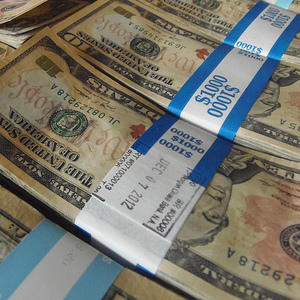In the early 2000s, housing prices in the U.S. rose quickly, and many people paid high prices to buy houses. In 2008, the housing market collapsed and prices fell fast. Many of the folks who had bought homes couldn’t make their monthly mortgage payments and couldn’t sell the houses for anywhere near what they paid for them. Many lost their homes to foreclosure. In 2012, an enterprising 14-year-old girl in Florida saw a business opportunity from the housing crisis. She started selling things that people had left in their foreclosed homes, eventually saving enough money to buy a house herself, which she rents out. Listen to learn how a 14-year-old became a real estate entrepreneur.
Listen to the story
MELISSA BLOCK: This is ALL THINGS CONSIDERED from NPR News. I’m Melissa Block.
ROBERT SIEGEL: And I’m Robert Siegel.
The housing crisis has been long and deep. Long enough that a 14-year-old girl in Florida struggles to remember what life was like before there were foreclosures everywhere. And deep enough that the same 14-year-old can buy her own house for just $12,000.
NPR’s Chana Joffe-Walt of our Planet Money team introduces us.
CHANA JOFFE-WALT: Willow has long, floppy bangs that hang at an angle and basically cover the top third of her face. So, looking at her head on, you see nose and braces. On her T-shirt, a life-size Lady Gaga face that’s 100 percent visible. Willow loves animals, as any self-respecting 14-year-old girl seems to – her favorite are ferrets.
Now, this is not how Willow would describe herself to you. She introduces herself by listing her worldly possessions. She’s really into things right now.
WILLOW TUFANO: I am Willow Tufano. I am 14. And I own a MacBook Air, a paddleboard, a long board, a Play Station 3, four ferrets. And I own a house.
JOFFE-WALT: The story of how Willow came to own her own house is a parable of American real estate. But before the house, just a minute on what it means to be a 14-year-old in Florida right now. Back in 2005, when some home prices in Florida nearly doubled one month to the next, Willow Tufano was seven years old. She hardly remembers that time.
Her family moved into a big house. Her mom became a real estate agent. She kind of has a faint memory of playing soccer with other kids in the neighborhood back then, but as Willow moved from childhood to adolescence, from soccer to skateboarding, the neighborhood emptied out.
TUFANO: Everyone is getting foreclosed on. Well, I think there might be someone in that tow-story house. Like, I saw a kid that looked my age. I don’t know though.
(SOUNDBITE OF A SKATEBOARD)
JOFFE-WALT: One nice thing about an empty block, it’s actually good for skateboarding. Willow has about a dozen completely empty driveways to choose from.
TUFANO: That’s the biggest hill here. The driveway…
(SOUNDBITE OF LAUGHTER)
TUFANO: …in Florida.
JOFFE-WALT: So here’s how Willow got set on the path to homeownership. After the housing collapse, her mom, Shannon, started working in foreclosures. She started helping investors bid on cheap, bank-owned homes. And about a year ago, one of Shannon’s investors bought a house across town on Derrick Street. And Willow went along with her mom, to go check out the house.
TUFANO: When I walked in there, it was filled with all kinds of stuff. There was furniture. There were lamps. Lots of different stools. Just a lot of it was like tropical, like Tommy Bahama-looking stuff. And there was stuff everywhere. I was like, Mom, what is he going to do with all this stuff?
And my mom was like, well, she’s probably just going to throw it out. Get rid of it, throw it at the curb. And I was like, well, I can sell this stuff if you want to let me have it.
JOFFE-WALT: The investor did want to let her have the stuff, gladly. He just wanted to flip the place. Willow sold everything from that house on Derrick Street and the next house, and then the next.
TUFANO: Yeah, profit.
(SOUNDBITE OF LAUGHTER)
JOFFE-WALT: Profit she says, braces gleaming.
Willow does not have friends really. I mean she’s lives in an empty neighborhood. She spends her time in abandoned houses Willow has Craigslist. She texts with buyers and sellers obsessively. She has this flashlight app on her phone just in case she needs to examine furniture that’s been discarded on the curb in the dark. She knows how to push product and she specializes in the ruins of a national housing collapse.
TUFANO: Like microwaves, I’ll price them really low, maybe 20 bucks. Because everyone wants stainless steel, so I have to price things cheap. What I sell probably best is maybe like a stove, maybe $100, or a white top bottom refrigerator. I know dishwashers do not sell well at all. You can only get like 10, five, $10 for those.
JOFFE-WALT: She says she averages about $500 a month profit.
TUFANO: About six months after I started doing all the Craigslist thing, I was like, what should I do with all this money?
JOFFE-WALT: The question sat around for a while, until Willow’s mom, Shannon Moore, saw a house on auction for $12,000. It was in a decent neighborhood and Shannon thought she’d recommend it to one of her clients.
SHANNON MOORE: I was telling husband about the house. And you came up to me and said, hey, I got an idea.
TUFANO: Yeah, I just had like this thing, I was like, what if I bought a house? That’d be crazy. And I’d be able to make money every month. I’d get rent. I wouldn’t have to worry. I wouldn’t have to – not that I have to worry now. But I mean, that’d be really cool.
We are at my house, Holdern, and it is 21440 Holdern.
JOFFE-WALT: That’s your mailbox?
TUFANO: Yes.
JOFFE-WALT: Willow and her mom split the house on Holdern. They each put in $6,000, and the idea is Willow will buy out her mom out in the next few years – maybe by the time she is 18 and she can formally put her name on the papers.
This $12,000 house was worth about $100,000 during the boom. So as you can imagine, the last owners did not take the loss happily.
TUFANO: When we walked in there was, like, glass everywhere. There’s a dirty couch tipped over. There was broken baby crib. There was a dirty old mattress. Nothing was worth anything. Like, there was a riot or something.
JOFFE-WALT: They cleaned it up. And now, a very nice, very young couple with a baby are moving in, Jon and Kelsey Smith. They’re renting the place for 700 bucks a month and they are just now meeting their landlord.
TUFANO: My keys for the house.
JON SMITH: I didn’t know my landlord is younger us.
JOFFE-WALT: Kelsey asks if they can hang pictures on the wall even though the lease says they can’t. Sure. Then Jon mentions they don’t have a bed yet and Willow perks up at this: I could help you get one cheap.
TUFANO: OK, do you want like a frame and headboard, and…
SMITH: She’d like that.
TUFANO: Do you want like a box spring and mattress?
JOFFE-WALT: When Willow put in an offer on the house in December, home prices across the country hit a new, post-bubble low. Twelve thousand dollars really is incredibly cheap for what is a nice place – concrete block home, two bedrooms, a yard.
I kept feeling like this is it. When a 14 year-old kid can buy a house, that’s got to be a sign of the bottom. Right? I kept saying to Willow, maybe you’re our signal that the market is turning. And she’d sort of vaguely nod.
TUFANO: I just – that was just what I wanted to do. I wanted to get a house. I wanted to rent it out. I wanted a house.
JOFFE-WALT: I think it’s hard for Willow to see herself as symbolic of anything. Because to a 14-year-old in Florida, the housing collapse just is what is. It is the landscape. It’s a Craigslist hobby. Willow is thinking she may save up for a second home.
 © 2012 National Public Radio, Inc. Used with the permission of NPR. All rights reserved.
© 2012 National Public Radio, Inc. Used with the permission of NPR. All rights reserved. Vocabulary
- housing boom – a time when house prices rise quickly
- housing market collapse – a sharp drop in housing prices after a boom
- foreclosure – when a bank takes possession of a property because the owner cannot pay the mortgage
- flip – to buy a property at a very low price with the intention of either selling or renting it for a profit
- profit – a financial gain
Listening Comprehension Questions
- Why is Willow Tufano the subject of an audio story? What is unusual about her situation?
- What was going on in the country and in Florida that led to Willow’s going into business?
- What was Willow’s first business venture?
- How did Willow become a homeowner?
- What is Willow doing with the home she bought?
- What does the reporter think is significant about Willow’s efforts?
Discussion Themes
- What does it mean in your mind to be an entrepreneur? What are some of the qualities exhibited by Willow Tufano in the story that make her a successful entrepreneur?
- Would you like to start your own business and become an entrepreneur one day?
Teacher’s Guide
Activate student knowledge: Open class by asking students what, if anything, they know about the housing boom of the early 2000s and the subsequent market collapse in 2008. Give students this basic explanation of the housing bubble: Housing prices skyrocketed in the early ’00s as demand for houses increased. Many people who probably shouldn’t have gotten loans based on their credit history were nonetheless given mortgages. And, in fact, many new homeowners couldn’t keep up with the payments. Neither could they sell their houses for anywhere near the amount they paid for them. The banks foreclosed—they took possession of the houses because the homeowner couldn’t repay the loans, and the former owners lost their homes and the money they had invested in them. Encourage students to think about the impact of a lot of people losing their homes to foreclosure at the same time.
Introduce the story: This audio story starts after the mortgage foreclosures that were an aspect of the 2008 financial crisis. What happens when whole neighborhoods empty out? What becomes of the empty houses? Listen to hear about a 14-year-old in Florida who became an entrepreneur. She started by selling items that people left behind when they had to leave their homes. Now she’s bought a house and fixed it up, and she is renting it out. She’s a 14-year-old landlord.
Active listening supports: Choose one of the following listening organizers to support student understanding as they listen to the story.
- The Question-Answer T-Chart will guide student listening as they takes notes on this audio story.
- The Language Identification organizer allows students to follow along and track important phrases while listening to the story.
Reflect on the story: Take time for student reflection on the audio story and discussion questions to check for understanding. Focus on the economic concepts addressed in the story: foreclosure, supply and demand, and entrepreneurship.
Paired Text: Use this New York Times story about what are the qualities of a successful entrepreneur Have students take note of the attributes in this story with the attributes of Willow Tufano.


